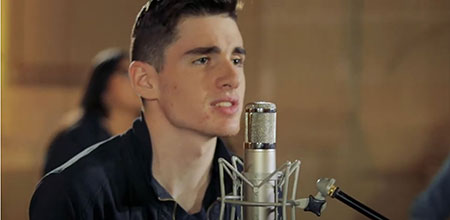Music Degree: Worship Arts
Bachelor of Arts (BA)
Credits
134
Completion Time
4 Years
Delivery Method
Traditional, On Campus at Lancaster, PA
Why Study Worship Arts at LBC?
Sing and play your heart out to God as you lead others in doing the same!
At LBC, we’re passionate about training students to lead God’s people in corporate worship grounded in a Scriptural understanding of arts and the church. As you learn, you’ll also be sharpening your own musical skills and developing as a servant leader.
On top of LBC’s unparalleled biblical instruction, you will gain tools and knowledge to engage people through the arts as you participate in the story of God together. You will be mentored by caring and experienced professors as well as local leaders, with ample hands-on opportunities to lead your peers and gain real-time ministry experience. Our students graduate prepared spiritually, academically, and professionally to serve in churches, retreat & conference centers, parachurch organizations, and beyond.
Course Length
16 weeks (semester)
Worship Arts Program Cost & Financial Aid
Admissions Process
Where LBC Students Have Interned
- Worship Coordinator in a Local Church
- Worship Leader at a Christian Camp
- Worship Leader for Retreats/Conferences
Can I Transfer Credits?
Yes! Read about LBC’s transfer policy
Music: Worship Arts Program Scope
Bachelor of Arts (BA) (131 Credits)
LBC 100 Foundations Seminar 1 Credit
Bible & Theology Core 33 Credits
Arts & Sciences Core 37 Credits
Music Courses 60 Credits
View the Academic Catalog for the complete curriculum plan, course descriptions and complete program details.
What makes this LBC Worship Arts program unique?
- Take part in internships with local churches to gain practical experience in preparing for and leading worship.
- Learn about practical ministry, philosophical understanding, ministry and top-notch performance training.
- Study under professors and professionals with many years of experience in leading worship at churches both nationally and internationally.
What are career paths with a Worship Arts bachelor's degree?
The Worship Arts program prepares students for a wide range of technical and/or ministry contexts. Here is a sampling of careers and opportunities this degree affords:
- Church Worship Leader
- Songwriter
- Performer
Program Goals – In this program, students will…
- Demonstrate basic musicianship skills in sight-singing, dictation, conducting, voice and piano.
- Describe and demonstrate the integration of Biblical faith in life and career as artists.
- Apply historical and theoretical understanding to the analysis, performance, and creation of musical forms, processes, and structures found in representative examples from the western music tradition.
- Design diverse corporate worship settings for response to God’s revelation and formation of the community.
- Exhibit leadership skills in mentoring and administration
Core Courses in the Worship Arts Program
- MUS 100 Music Fundamentals
- MUL 101 Piano Lab I
- MWP 400 MWPA Cross Cultural Externship
- MWP 102 Intro to Music, Worship, & the Performing Arts
- MUS 101 Music Theory I
- MUS 101L Musicianship I Lab
- MUL 102 Piano Lab II
- MUS 102L Musicianship II Lab
- MUS 211 Introduction to Composition
- MUS 211L Musicianship Lab III
- MUS 301L Musicianship Lab IV
- MUS 212 Contemporary Theory & Arranging
- MUS 231 Songwriting
- MUS 312 Rhythm Section Methods
- ENS Ensemble (primary)
- ENS Ensemble (secondary)
- MAP ____ Applied Music Lesson [7]
- WOR 499 Senior Project
- MAP 100 MPWA Forum
- MUL 101 Piano Lab I
- MUL 102 Piano Lab II
- MUL 121 Contemporary Voice Lab
- MUL 111 Guitar Lab I
- MUL 112 Guitar Lab II
- MWP 301 Worship & Performing Arts Internship I
- MWP 302 Worship & Performing Arts Internship II
- MWP 450 Worship & Performing Arts Practicum
- PRO 101 Introduction to Electronic Media
- WOR 401 Biblical & Theological Issues in Worship
- WOR 402 Administrative Process in Worship Arts
- Major Elective
Admission Steps
for this Major
Audition for Acceptance into this Major
Every student who applies to any major in the Music, Worship & Performing Arts Department must audition for acceptance into the major of their interest and must also be accepted as a student to Lancaster Bible College.
